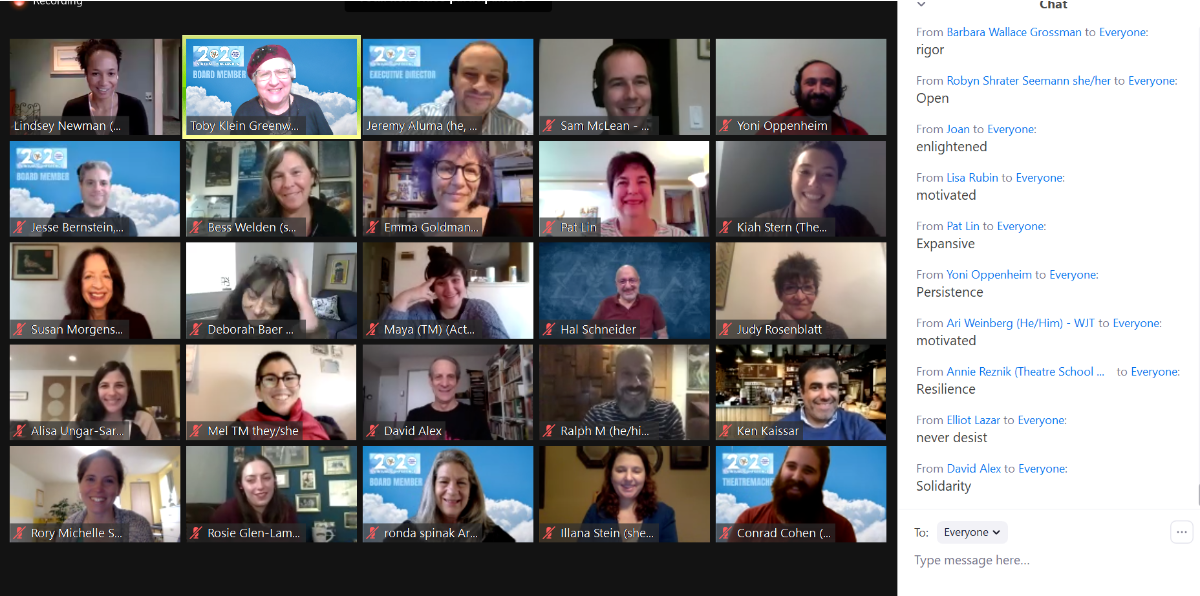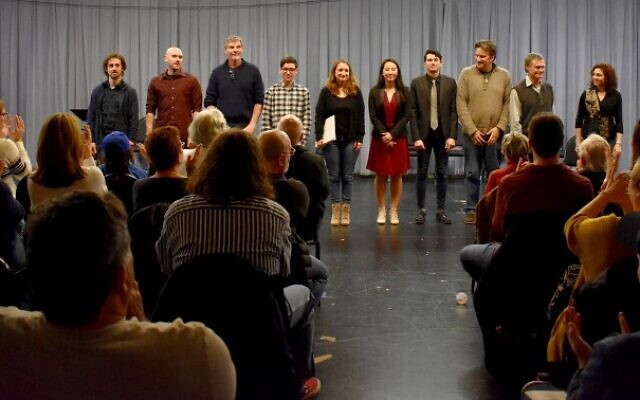Hope for Theaters
President of two arts organizations sees surge in membership during the pandemic.
Across America, theaters big and small have shut their doors due to COVID-19.
The future of the theater scene seems bleak. But two arts organizations, the Alliance for Jewish Theatre and Working Title Playwrights, have been bursting at the seams with new members during the pandemic.
Hank Kimmel, board president of the two organizations, is energizing them through an infusion of faith values, diversity and hope.
“To be honest, when I moved to Atlanta from New York during the 90s I thought it was the end of my theater activities. But it was really the beginning of them.”
In 2000, WTP unofficially started when Kimmel and a group of five people began meeting at various places, including the Emory University campus, to read and critique each other’s plays.
Meanwhile, Kimmel was still trying to gain a footing in his new hometown.

“As I got more immersed in Atlanta life, I joined The Temple. I had never been affiliated with a synagogue or with organized religion, but discovering my Judaism helped me have a much deeper connection to the theater,” Kimmel said.
For 14 years, Kimmel was the membership chair at The Temple, which has a long history of activism dating back to the times of Rabbi Jacob Rothschild and his friendship with Martin Luther King, Jr.
“I learned so much about running an effective nonprofit through just actively working in the synagogue and meeting great people and through believing in the tzedakah. All of it has made me a compassionate leader.”
One of the main tenets of tzedakah is service to the community, and Kimmel sees the arts organizations he helps lead as service communities in that members have access to the resources that help them craft powerful stories about life that resonate with the broader community.
As a local arts organization, WTP has gained momentum and built a strong reputation. It has over 200 artist members, offering playwriting classes, seminars and writing scholarships. One of the popular events is Monday Night Critique Sessions, which gives playwrights the opportunity to have their plays read aloud and critiqued by professional actors, playwrights and dramaturgs.
In 1979, the Alliance for Jewish Theatre began as a global arts organization comprised of theaters and theater artists to create, present and preserve traditional and non-traditional theater about the Jewish experience. To date, the Chicago-based AJT has over 200 participating artists and theaters.

“We just had our first virtual conference this year, and we had our highest attendance to date,” Kimmel said. AJT’s conference had award-winning speakers and playwrights including Mara Isaacs, Snehal Desai and Anna Ziegler. There were playwriting workshops, forums and anti-racism training.
The most important missions of both organizations are equity, diversity and inclusion. Kimmel confirms that Amber Bradshaw, the managing artistic director of WTP, has been instrumental in implementing its inclusive community.
“We can’t dismantle racism if we can’t talk about it in a space that gives us permission to speak our truth. It is my personal mission to make sure we are always providing that space for artists,” Bradshaw said.
AJT’s first paid artistic director was Jeremy Aluma. He said he believes that the pandemic caused the Jewish community to view diversity in a different way.
“This pandemic has made Jews question their own identities. My grandparents were from Baghdad. They had to escape when they started murdering Jews there. But I never see any plays about Middle Eastern Jews. We need to start telling more stories about Jews from diverse places.”

Kimmel echoes those sentiments about diversity.
“When people from diverse backgrounds collaborate and tell their stories, it can be transformative. When stories become personalized, it leads to actions. A lot of white people told me that they didn’t realize how much black people were going through until they heard some of the stories at WTP’s community forums,” Kimmel said.
He is proud that WTP and AJT have continued to be creative havens during these tumultuous times.
“People are craving to create and connect with each other. We’ve especially seen a diversity of younger people.”
In addition to being board president, Kimmel is a lawyer, and has written more than 40 plays with productions in theaters across America. He calls himself a theater maker instead of a playwright because of the many talents he has developed such as producing, dramaturgy and writing. His plays are steeped in humor because he believes it is the best way to deal with the ironies and misdirections in life. Part of his writing success, he said, is that he doesn’t waste an opportunity to write.
“I write whenever I can. I cram writing in every part of my life. If I have time in between court proceedings, I’ll write.”
Last month, the Jewish Repertory Theatre produced filmed staged readings of Kimmel’s Holiday Shorts. Also, the Quarantine Players organization is producing Kimmel’s Jewish stories collections. Some of the titles include “The Day Santa Ignored Us” and “The Music Man Goes Yiddish.”
Looking to the future, Kimmel said he believes COVID will go away and the people involved in WTP and AJT will emerge from the pandemic better writers, collaborators and friends and will change the community with unforgettable stories.
Kimmel lives in Atlanta with his wife Barbara (who is also a writer) and their three children.
For more information www.hankkimmel.com, https://workingtitleplaywrights.com/, https://alljewishtheatre.org/.




comments